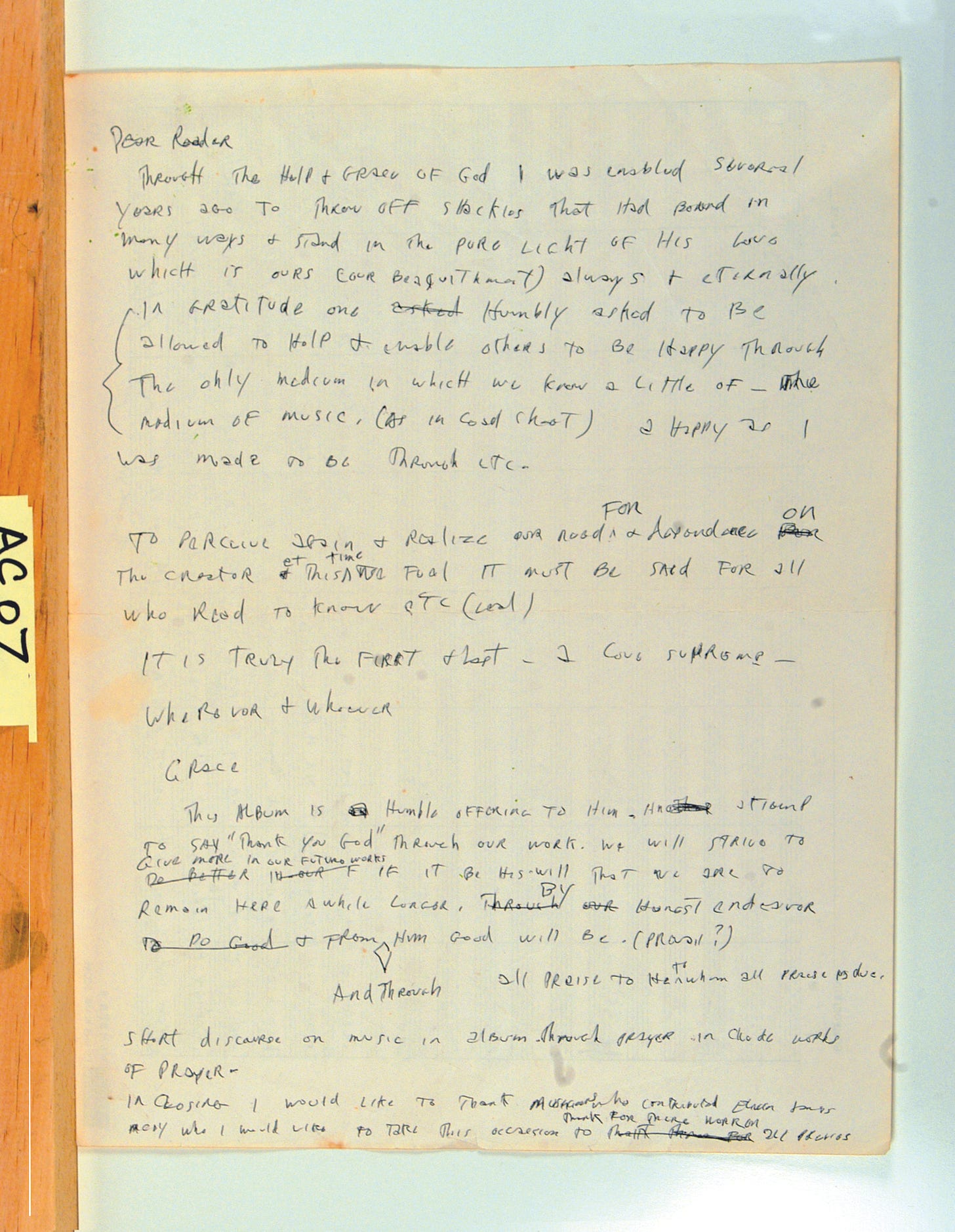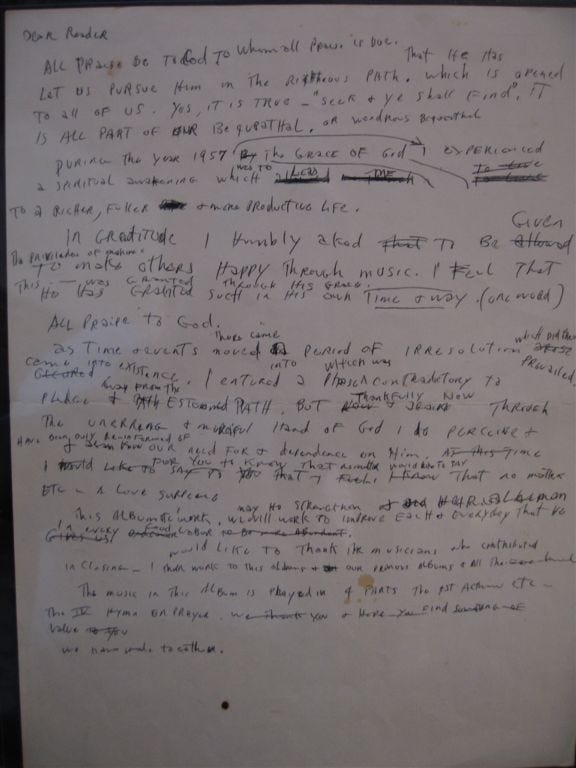Looking now at Coltrane’s other note pages, there are several drafts of the album notes (known as “liner” notes). The album opened up like a folder, and Coltrane’s writings were inside. We will be talking quite a bit about these notes, so you might to have them handy to compare with the sketches below. For your convenience, here is a photo of the album’s inside with good resolution, so that you can enlarge it.
The were two parts to the notes—an introduction in the form of a letter to the listener, and a poem which he referred to as a “prayer.” Let’s start with the letter. The page labeled AC07v6 by the auction house is draft of the introduction. It is probably an early draft, because it is quite a bit different from the published version. Some of the same ideas are there, but they are expressed very differently. For example, at the top of the page, he writes: “Through the help & grace of God I was enabled several years ago to throw off shackles that had bound in many ways and stand in the pure light of his love…” Compare that with this from the album notes: “During the year 1957, I experienced, by the grace of God, a spiritual awakening which was to lead me to a richer, fuller, more productive life.” Also, he begins “Dear Reader,” whereas on the album he writes “Dear Listener.” Here it is:
Further down the page, in the second paragraph from the bottom, he writes, “We will strive to give more (“do better” is crossed off) in our future works if it be his will that we are to remain here a while longer.” It’s ironic and sad that Coltrane was only to live about another year and a half, but let’s not read too much into this. It’s a fairly standard religious sentiment, and by all accounts he didn’t feel seriously ill until very near his death in July 1967. This is not an indication that he knew his time was short.
At the bottom he reminds himself to include a “Short discourse on music in album through prayer [sic] include words of prayer.” As we will see, the last movement, “Psalm,” is a reading of those words of prayer, so perhaps that’s what he means. But he’s probably also referring to the fact that he will include the entire prayer, or poem, in the notes.
Next, there is another draft of the album notes that is much closer to the final version, although he still begins with “Dear Reader.” For example, the sentence we looked at above that starts “During the year 1957” is pretty much in its final form (starting about 5 lines from the top), and you can see where he crossed out a few words to get there. Before that, on the fourth line, he writes of “our bequeathal,” which he changed to “bestowal” in the published form. After stating that he was granted the privilege to “make others happy through music,” there’s a sentence that does not appear in the final form: “He has granted such in His own Time&Way (one word).” Near the bottom there’s another sentence that he cut: “We will work to improve each and everyday (sic) that he gives us.” “Gives us” is crossed out, and you can see that he did some editing to this, but he eventually decided to leave it out.
The rest of the “letter” is incomplete. He says, “In closing, I would like to thank..” and he writes a brief sentence. But on the album his thanks and acknowledgements take up more than two paragraphs. Also, on the album he names all four parts of the suite, but here (at the bottom), he only names Part IV, which he calls “Hymn on prayer.” If you look back at his other notes that we’ve studied, you’ll realize that he hadn’t named any of the four movements yet. It was typical for him (and in fact for many jazz artists) to not have titles until the last minute. Earlier, he called this one a “prayer,” and now it’s a “hymn” based on the prayer (the poem). The title “Psalm” doesn’t appear in any of his notes that I have seen. At the very bottom he’s trying out a sentence that says “We thank you and hope you find something of value (“to you” is crossed out) we have made together.” But he’s clearly editing that one a lot, with words crossed out, and it did not make it into the final version.
Some of the missing material from the end of this letter appears at the bottom of one of his pages of sheet music. In the next post we will look at the music notation from this page. But let’s look at his words for the introduction now:
He writes a reminder to himself to “thank [sic] to Shepp and Davis (& apologies if necessary),” referring to the phrase that he later added, that their recorded contributions “regrettably will not be released at this time.” Among other passages that we recognize from the published notes, he works on this line: …“in the bank of life Isn’t good that investment which (written over “that,” I think) surely pays (written over “brings”) us the highest and most cherished dividends (“peace of mind?,” crossed off). In the published album notes, the sentence reads: “…Our appreciation and thanks to all people of good will and good works the world over, for in the bank of life is not good that investment which surely pays the highest and most cherished dividends?”
In the next post, we’ll move on to his drafts of the poem, and to the last bits of music notation. Thanks for staying with me this far!
All the best,
Lewis






I find the rephrasing of the liner notes another peep into the mind and soul of tis most remarkable man. Your deliberate and thoughtful way of examining the material in its early stage helps us to see deeper into Coltrane's masterpiece. Thank you!
Gerard
Powerful stuff. And another reason why owning physical copies of albums gives you things that are mostly unavailable in the digital realm. CDs would often have more liner note content, but much smaller print and photos. Some labels were too cheap to even bother with lining notes, you'd eagerly open the album hoping to see something informative about each song. Lyrics for rock music, who's playing what on each track, any guests sitting in. Some background on the band itself, the musicians, how the album came to be. And you'd get the white sleeve treatment so they could save a dime. The double albums could be useful for rolling doobies!